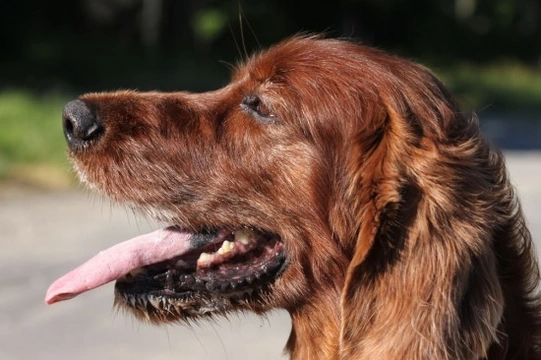
Thyroid problems in dogs
The thyroid is a gland located in the neck of the dog, and is responsible for releasing the hormones that are responsible for digestion, metabolism and weight regulation. Healthy thyroid function is essential to helping your dog to maintain a healthy weight without getting too fat or too thin, and to aid them in the digestion of their food and ensure that they absorb all of the essential nutrients that it contains. Problems with the thyroid gland in dogs can lead to a range of problems and conditions, all of which can be potentially serious and will require supplementary regulation and treatment.Being able to identify the signs of an impending issue with the thyroid gland is important, to make sure that any problems are caught early on and can be successfully managed and treated.
What does the thyroid gland do?
The thyroid gland is responsible for the production of two natural hormones, known to as T3 and T4 respectively. As your dog grows from a puppy to a full sized dog and reaches sexual maturity, the thyroid gland begins production of these two essential hormones, which are essential to the body’s natural ability to metabolise its food and maintain weight and condition. Occasionally, and for a range of possible reasons, the thyroid gland will begin to produce either too much or not enough of these hormones, which can lead to a range of problems with maintaining fitness, condition and general health. Left unchecked, this can cause a progressive decline in the health of your dog, and can eventually lead to a range of secondary conditions and problems that may eventually prove fatal. Thyroid problems may also be caused by cancer of the thyroid gland or surrounding area, which can lead to secondary complications too.
Different types of thyroid problems in dogs
Problems with the thyroid gland are broadly divided into two separate categories; hypothyroidism, where the thyroid gland does not produce enough of the T3 and T4 hormones, and hyperthyroidism, where the thyroid gland produces too much of one or both of the hormones. Either of these conditions can prove problematic and harmful to the health of your dog, although their signs and symptoms are quite different. Hypothyroidism is much more common in dogs than hyperthyroidism, with hypothyroidism accounting for around 90% of all thyroid problems that dogs are diagnosed with.
Symptoms of hypothyroidism in dogs
Hypothyroidism, the condition where the thyroid gland does not produce enough of the T3 and T4 hormones, usually presents with some or all of the following symptoms:
- Lethargy and sluggishness
- Weight gain without a corresponding increase in food intake
- Dry, unhealthy looking skin and a dull coat
- Excessive shedding of the coat
- A lower than normal body temperature, particularly around the extremities
Symptoms of hyperthyroidism in dogs
Hyperthyroidism is the rather less common condition where the thyroid gland is overactive, and produces too much of the T3 and/or T4 hormones. Symptoms of hyperthyroidism include:
- Increased appetite
- Weight loss despite eating more food than normal
- Excitability or excessive energy
- Increased heart rate
- Frequent need to urinate
- Vomiting and diarrhoea
- Occasionally, breathing problems and shortness of breath
What types of dogs are most likely to develop thyroid problems?
Any age and breed of dog can potentially develop a thyroid disorder, although thyroid problems are slightly more common in giant dog breeds than their smaller counterparts. As your dog ages also, they will become at increased risk of developing thyroid problems alongside of aging. Both male and female dogs may potentially develop a thyroid problem, and spaying or neutering your dog while they are very young, and before the thyroid gland has begun production of sufficient T3 and T4 hormones to regulate the metabolism can lead to hypothyroidism developing in the adult dog.Also, some specific breeds of dog are considered to have an elevated genetic predisposition to contracting generalised thyroid issues and hypothyroidism in particular, including:
- German shepherd
- Akita
- Irish Setter
- Old English Sheepdog
- Rottweiler
- Boxer
- Doberman Pinscher
- Labrador
- Cocker Spaniel
- Beagle
- Great Dane
- Golden Retriever
Treatment and prognosis for dogs with thyroid problems
Thyroid abnormalities and evidence of the over or underproduction of the thyroid hormones are usually diagnosed by means of blood testing, although your vet may need to take scans and x-rays to rule out the possibility of a tumour or cancer affecting the thyroid gland as well. Feeding a good, complete and balanced diet is important in managing thyroid conditions in dogs, and can in fact help to prevent thyroid problems from developing in the first place.Once a thyroid problem has been diagnosed, treatment of any underlying cause such as a tumour or growth will need to be performed before the production of the thyroid hormones themselves can be addressed. Hormone replacement therapy and the artificial supplementation of the T3 and T4 hormones is usually required in cases of hypothyroidism, and unless the condition corrects itself over time due to changes in diet or the treatment of an underlying cause such as cancer, the administration of supplementary hormones will generally be required for the duration of the dog’s life.Synthetic thyroid hormone supplements usually come in tablet form, and need to be administered once or twice a day. The good news is that these medicines are relatively inexpensive, and after initial diagnosis and treatment, the ongoing cost of providing the medication to treat hypothyroidism works out at just a few pence per day.



